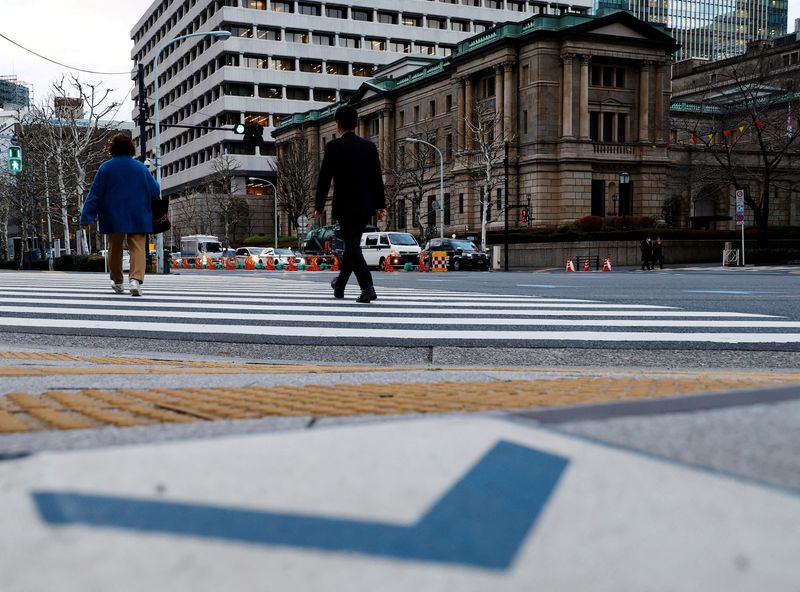By Leika Kihara
TOKYO (Reuters) -The Bank of Japan should consider ending its yield curve control and massive asset purchases now, then gradually raise short-term interest rates, the IMF said on Friday, as markets ramp up bets on a near-term turn in the central bank's ultra-easy policy.
As Japan's economy continues to recover, domestic demand is replacing rising costs as the main driver of inflation with the output gap closing and labour shortages intensifying, the International Monetary Fund said.
"The BOJ has been appropriately cautious, given Japan's history of deflation and mixed signals from recent data. That said, upside risks to inflation have materialized in the past year," the global lender said.
"In the near term, the focus should shift to tighten fiscal policy and wind down unconventional monetary policy, while maintaining financial stability," the IMF said in a statement after its annual policy consultation with Japan.
With inflation having exceeded 2% for well over a year, the BOJ has been laying the groundwork for ending a complex stimulus programme comprising a massive asset-buying programme dubbed quantitative and qualitative easing (QQE), a negative short-term interest rate and yield curve control (YCC) - a policy that caps long-term interest rates around zero.
Many market players expect the BOJ to end negative rates this year with the most popular timing seen as April, according to a Reuters poll.
"The BOJ should consider exiting YCC and ending QQE now while gradually raising short-term policy rates thereafter," the IMF said.
GRADUAL EXIT
Ending its negative interest rate policy, in place since 2016, will likely be smooth as there is a clear recognition by investors that inflation-adjusted real borrowing costs will remain very low, IMF First Deputy Managing Director Gita Gopinath told Reuters on Friday.
But further hikes in the short-term policy rate ought to be gradual and delivered in the course of several years, she said.
"Regardless of whether you do the first increase in two months or three months, the main point is to raise (rates) slowly, over a few years," Gopinath said.
In a briefing in Tokyo later on Friday, Gopinath said March data on wage developments would be among important indicators that determine the timing of an end to negative rates.
"If that comes in line with current expectations, of course there could be reason to move rates" sometime this year, she said. Many big Japanese firms conclude their annual spring wage negotiations with unions in mid-March.
The BOJ next meets for a policy-setting meeting on March 18-19, followed by another one on April 25-26.
The IMF criticised the government's energy subsidies and a plan to offer near-blanket income tax cuts as "not warranted," given Japan's economic recovery and high debt-to-GDP ratio.

"Given its temporary nature and Japanese households' low propensity to consume, the untargeted income tax cut is expected to have a limited impact on growth," the IMF statement said.
"In addition, energy subsidies can distort energy consumption and hamper decarbonization initiatives and should be replaced with targeted transfers to vulnerable households."